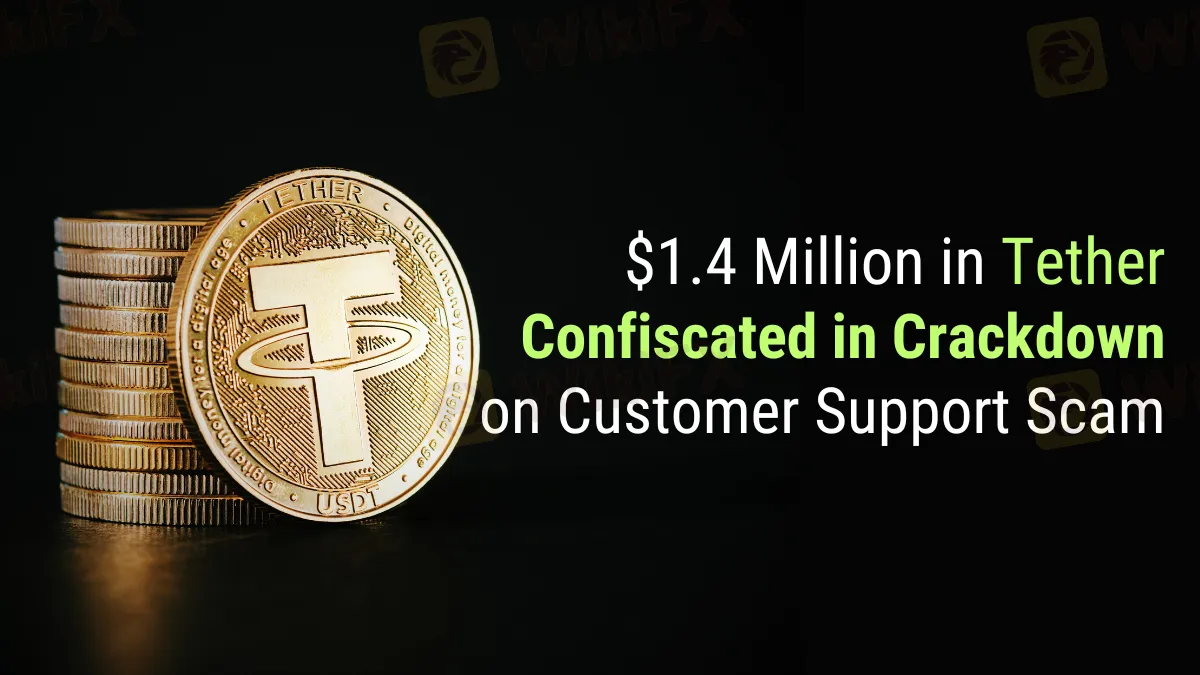简体中文
繁體中文
English
Pусский
日本語
ภาษาไทย
Tiếng Việt
Bahasa Indonesia
Español
हिन्दी
Filippiiniläinen
Français
Deutsch
Português
Türkçe
한국어
العربية
$1.4 Million in Tether Confiscated in Crackdown on Customer Support Scam
Abstract:US Attorney's Office seizes $1.4M in Tether from scam, exposing tactics targeting vulnerable populations. Implications for crypto regulations & DeFi.

In an enormous attempt to stop fraudulent activities, the United States Attorney's Office in Chicago, Illinois, has taken down a customer service scam business and seized about $1.4 million in Tether (USDT). This operation highlights the evolving tactics used by fraudsters in the Internet age, namely targeting the elderly and other vulnerable populations.
Tether, the DOJ, and the FBI were in charge of organizing the theft on March 12. Scam pop-ups said that the victims' computers had taken over as a component of a larger scheme. They informed the victims that their bank accounts were at risk when they called the fictitious customer service number. Following their deception of the victims into thinking USDT would safeguard their property, the scammers asserted their ownership of the tokens.
An uncommon accomplishment in the battle against digital fraud is the successful recovery of USDT from an unhosted digital currency wallet, which sets this instance apart. A January 24 document reveals that the money seized was painstakingly traced to five separate wallets linked to a wire fraud scheme, even if the precise details of the recovery procedure are still unclear. Money laundering may have occurred because intermediate addresses transmitted small amounts of money.
Despite conducting a significant portion of its activities in foreign countries, Tether remains subject to regulatory oversight by the Office of Foreign Assets Control (OFAC) of the United States. The recent sanctioning of Tether's association with Tornado Cash, an Ethereum network coin mixer, by OFAC, underscores the need for international collaboration in the battle against money laundering in the cryptocurrency business.
Future stablecoin rules will provide Tether with significant challenges in the long term. According to recommendations made by organizations like JPMorgan Chase, the government may ultimately favor stablecoins that adhere to AML and Know Your Customer (KYC) regulations. These restrictions are becoming more open. The decentralized finance (DeFi) sector could potentially experience substantial transformations in light of these legal developments, considering the USDT's significance as a collateral and liquidity resource. Ensuring the protection of consumers against fraudulent activities continues to be a principal consideration as the digital banking industry progresses.

Disclaimer:
The views in this article only represent the author's personal views, and do not constitute investment advice on this platform. This platform does not guarantee the accuracy, completeness and timeliness of the information in the article, and will not be liable for any loss caused by the use of or reliance on the information in the article.
Read more

The Funded Trader: Reactivates Accounts with Revised Payout Structure
Proprietary trading firm The Funded Trader has detailed its financial recovery efforts following a turbulent period marked by an unsustainable payout model. Addressing these challenges publicly, the firm outlined the steps being taken to resolve outstanding obligations and ensure operational sustainability.

Doo Group Broadens Global Footprint with Indonesian Broker Acquisition
Doo Group has announced its acquisition of PT Prima Tangguharta Futures, a Jakarta-based broker specialising in online derivatives trading. This move represents a significant step in Doo Group's regional expansion strategy and reinforces its growing presence in Southeast Asia.

Google Warns of New Deepfake Scams and Crypto Fraud
Google exposes deepfake scams, crypto fraud, and app cloning trends. Learn how to spot these threats and safeguard your data with expert tips and advice.

Why Is UK Inflation Rising Again Despite Recent Lows?
October inflation rises to 2.3%, driven by energy costs. Renters face 8% annual hikes, while house price inflation climbs. Interest rates stay elevated.
WikiFX Broker
Latest News
GCash, Government to Launch GBonds for Easy Investments
eToro Expands Nationwide Access with New York Launch
Webull Partners with Coinbase to Offer Crypto Futures
Why Is UK Inflation Rising Again Despite Recent Lows?
Interactive Brokers Launches Tax-Friendly PEA Accounts in France
Countdown to WikiEXPO Dubai 2024 — “Seeing Diversity, Trading Safely”
Former Director Sentenced for Share Disclosure Breach
PayPal Expands PYUSD Use for Seamless Cross-Border Transfers
Trump Media in Talks to Acquire Crypto Firm Bakkt
Partnership Alert: TLC 2.0 Becomes UP Nawabs'Associate Sponsor
Currency Calculator


